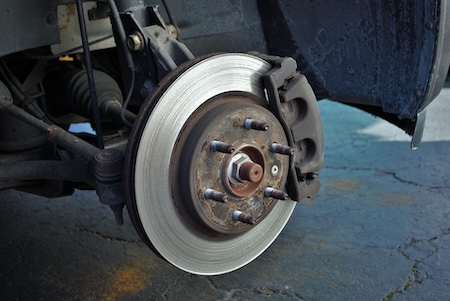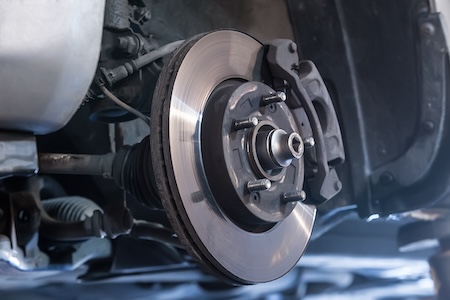Are your rotors trying to tell you something?
Your brakes are one of the most important safety systems in your car. While you might be replacing brake pads regularly, what about brake rotors? They’re often ignored until there’s a real problem.
Here in Colorado, steep grades, sudden stops, and stop-and-go traffic are all part of the daily driving experience. Your rotors are doing a lot of work behind the scenes.
So how do you know when it’s time to replace brake rotors? Let’s break it down.
What Are Brake Rotors, and Why Do They Matter?
Every time you press the brake pedal, your vehicle’s brake pads press against the brake rotors (also known as brake discs) to slow the vehicle down. This friction is what brings your car to a stop.
Over time, that friction takes its toll. Rotors get thinner. They can warp, crack, or develop grooves. And if left too long, they can compromise your car’s ability to stop safely. Especially on Colorado’s icy roads or steep mountain passes.
Ignore your brake rotors and it could be a safety issue. Let your rotors go too long and it could wind up costing you a whole lot more than replacement cost.
6 Signs It’s Time to Replace Brake Rotors
Let’s talk symptoms. Your car is trying to communicate—are you listening?
1. Vibrations or Pulsing When Braking
Feel a shake in the steering wheel or brake pedal when you slow down? That’s often a sign of warped rotors. Warping happens when rotors overheat and the surface becomes uneven. Once warped, they can’t make full contact with the brake pads. That compromises stopping power.
2. Squealing or Grinding Noises
If your brakes start to squeal or grind, it’s not just the pads. Deep grooves in worn rotors can cause uneven wear and strange noises. If you hear metal-on-metal grinding, it’s time to have your brakes inspected ASAP.
3. Visible Grooves or Scoring
If you can see deep lines or gouges on your rotor’s surface, that’s a problem. Rotors should be relatively smooth. Excessive scoring means the rotor is no longer making even contact with the pad, which reduces braking efficiency and increases wear.
4. Longer Stopping Distances
If your car isn’t stopping as quickly as it used to, even if your pads are fairly new, your rotors may be to blame. Worn or glazed rotors can reduce friction, meaning it takes longer to stop. On Colorado roads, that can be a recipe for disaster.
5. Rust and Corrosion
A little surface rust on rotors is normal, especially after rain or snow. But if the rotors are heavily corroded, or if rust begins to form on the edges and inner surfaces, it’s a sign of long-term neglect. In severe cases, rust can eat away at the rotor and weaken it structurally.
6. Warning Lights or Failed Brake Inspection
Some vehicles have sensors that trigger a brake warning light. Even if they don’t, your mechanic may point out rotor wear during a routine inspection. Don’t ignore their advice. Replacing rotors before a failure happens is always the better choice.
What Happens If You Don’t Replace Worn Brake Rotors?
Short answer? It gets expensive. And dangerous.
Worn rotors can:
- Destroy your brake pads quickly (which means more frequent replacements)
- Lead to complete brake failure if they crack or separate
- Cause heat buildup and damage to your calipers or other brake components
- Increase your risk of an accident, especially on slippery or hilly terrain
And once one component fails, it often leads to a cascade of repairs. Rotors are cheaper to replace than the entire brake system.
How Often Should You Replace Brake Rotors?
There’s no one-size-fits-all answer. Replacement depends on:
- Driving habits (aggressive braking wears rotors faster)
- Environment (mountain driving, cold winters, stop-and-go city traffic)
- Material and quality of the rotor itself
As a general rule:
- Standard rotors may last 30,000 to 70,000 miles
- High-performance or heavy-use vehicles may need replacements sooner
The best way to know? Schedule regular inspections, especially when you get your brake pads replaced. At a minimum, your rotors should be checked every 10,000 to 15,000 miles.
Can You Resurface Rotors Instead of Replacing Them?
Sometimes. Resurfacing (or turning) rotors means shaving down the rotor’s surface to remove grooves or unevenness. But that’s only possible if the rotor is still thick enough to meet minimum safety standards.
Modern rotors are often too thin to resurface more than once, if at all. Your mechanic will measure the thickness and determine if replacement is safer.
In Colorado’s demanding driving conditions, many shops recommend replacement over resurfacing for long-term reliability and performance. Not sure what to do? We’ll walk you through your options and help you make an informed decision.
Replacing Brake Rotors: What to Expect
When you bring your vehicle in for brake work, here’s what typically happens:
- Inspection – One of our mechanics checks the pads, rotors, calipers, and fluid.
- Measurement – They measure rotor thickness and compare to manufacturer minimums.
- Replacement or Resurfacing – Depending on condition and wear.
- Reassembly and Test Drive – After installation, they test your brakes for smooth operation.
If you’re replacing pads but not rotors, ask whether your rotors are still in good shape. Installing new pads on bad rotors is like putting new shoes on a worn-out treadmill—it’s just not going to work well.
Don’t Wait for a Brake Emergency
Driving around Denver, you rely on your brakes more than you might realize. Navigating snowy roads, rolling through the foothills, or dealing with rush-hour traffic, you do it all safely because of your braking system. That’s why replacing brake rotors before they fail is such an important part of car care.
If you’ve noticed vibrations, noises, or braking changes—or you just want peace of mind—come see us.
We’ll inspect your brakes, give you an honest assessment, and only recommend what you truly need. No pressure, no upsell—just expert care from a family-owned shop that treats you like one of our own.










